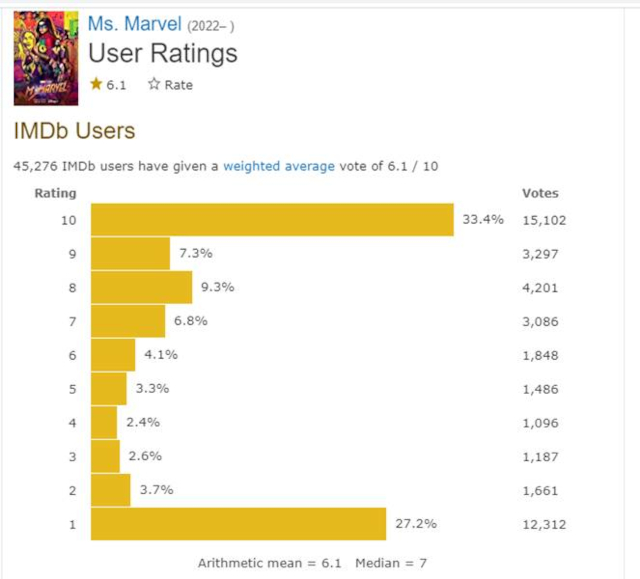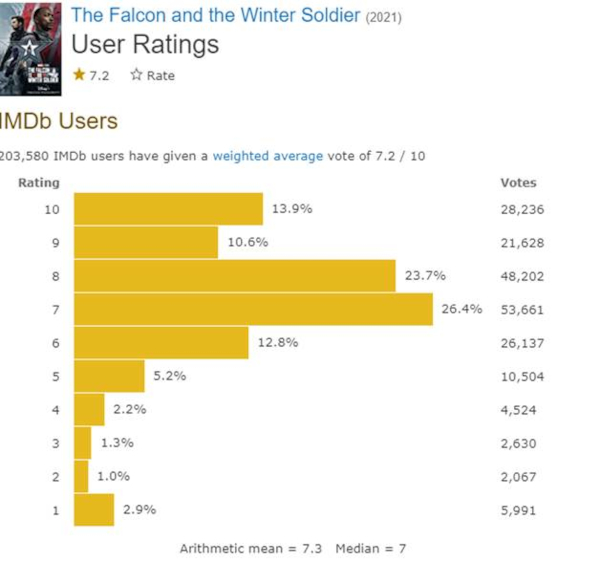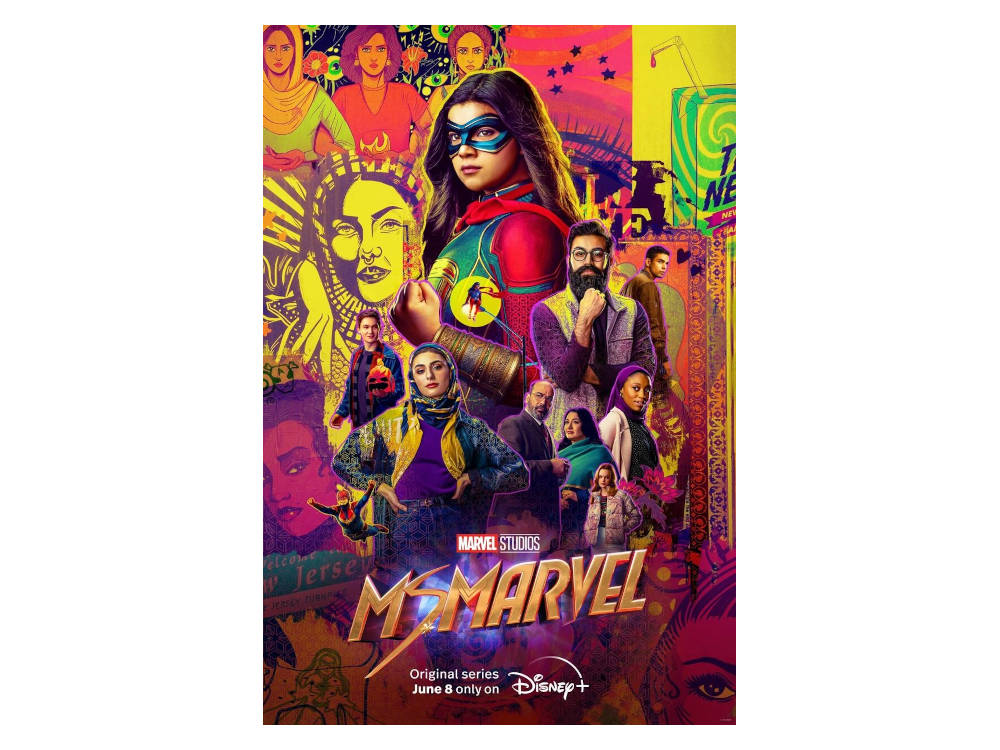[Poster from Marvel.com]
As of writing this article, four episodes of Ms. Marvel are out, and it’s yet to take off. It’s about a Pakistani, Muslim, teenage superheroine, who conforms neither to super babe body type, nor bothers to dumb down the subculture to those who aren’t from it. Unfortunately, there are forces at work keeping it from getting the traction it deserves.
I’m a believer that mainstream media informs and biases society. I also believe that if you’re going to change societal perceptions, mass media is the way to do it. There’s a bit in Freakonomics that talks about how a Superman radio show was responsible for dismantling the Ku Klux Klan, because so many impressionable White racists read comics. So when the recent Lara Croft games are a celebration of the feminine action star, or Mad Max Fury Road does not pass the reverse bechdel test, I’m rooting from the sidelines. I know that, more than Little Women or Legally Blonde, these works are probably making greater strides in changing perception, because they’re doing it from a bedrock of a usually problematic (in this case misogynistic) genre. And you’re more than likely to have a large percentage of your viewers/consumers of the type of mindset that needs this kind of exposure.
And then there are the Islamophobes. From India to the US, chances are good they’re fans of the big fantasy and action. (I’m not saying most Top Gun fans are Islamophobic, but a fair percentage of Islamophobes are likely to be Top Gun fans too).
Given that the absolute largest power in mass media right now is the Disney behemoth, with its $25bn+ Marvel Cinematic Universe (MCU), more than 2.5X any other movie franchise, when they take a risk of bringing limelight to the marginalized, we should be paying attention.
Risk you think yourself? How on earth is this a risk? It’s a risk because haters are hating, propelling algorithms, and if you don’t push for the voice of inclusivity, Ms. Marvel is going to fly right under the radar.
I present to you exhibit A, Ms Marvel’s IMDb ratings vs exhibit B the ratings of the mediocre Falcon and the Winter Soldier. Are you spotting something wrong in this?


Rotten Tomatoes, which has a mechanism to tabulate only what the critics say has Ms. Marvel at 96%, which ties her with Black Panther as the highest rated work from the house of Marvel. That’s a full 4 percentage points more than Loki. However, with the only viewership data we have (US households only), her first week viewership is at less than a third of Loki’s first week audience. In fact, it has only half of the first week audience of the worst performing Marvel series, Hawkeye. Ms. Marvel is a rockstar that swan-dived into her audience, and instead of catching and celebrating her, they parted like Musa’s red sea. (I’m not sure if it’s a religion thing or a lady thing, but either way I’m mad as hell.)
I’m actually not arguing too strongly about the artistic merits of the show. You’ve seen Marvel stuff, you know what it’s about. Underdog person discovers themselves, an overambitious baddie, things go boom, everything ends happy, everyone feels happy. But this is a show about someone ethnically from the subcontinent. By all rights it should be huge over here. And it isn’t, so this article is my attempt to sway people and rectify that.
So why has Marvel created a show about a Pakistani superheroine for Disney+, when Disney+ is not even available in Pakistan? For that let’s get into a quick history lesson.
Marvel’s comic sales in the 2000s were almost always in a constant state of decline. Like its movie franchise, Marvel comics tried to bolster their sales with the old staples, Spiderman, Wolverine, all the fan favourites. Every so often, they’d try a gamble on something new. So, when editor Sana Amanat pitched Kamala Khan, a scrawny Pakistani American, to take on the moniker of Ms. Marvel, they took a punt.
Unlike the fetishizing of desi culture (I’m looking at you Slumdog Millionaire), Kamala Khan aka Ms. Marvel is written with absolute honesty. Kamala has to balance out her religion, her second-class citizen status, and learn, more than anything, to be accepting of herself. She’s also written with a fair amount of doe eyed spunk, which makes her a fan favourite. Her series started in Feb 2014, and by October 2014, Ms Marvel was the bestselling graphic novel that month, and by November it was Number 2 on The New York Times bestseller list. Soon graffiti artists were painting over anti-Islamic ads with her image and the line “Ms Marvel will save you now”.
Think about this for a moment, Marvel has greenlit a show headlining a superhero who is non-white (3 out of 35 MCU films and Disney series), female (4 out of 35 MCU films and Disney series) from a property that is only eight years old. And they cast a first-time actress (Iman Vellani) as the lead (1 out of 35 MCU films and Disney series). So yes, Marvel is taking a risk. (For those of you who were wondering, I’ve taken the cut of stuff directly produced by Kevin Feige to make this stat, for no other reason but to make the number manageable.)
The series is fairly good, as Marvel series go. It’s imaginatively shot, with some added spice of intriguing video animation (graffiti that represents Kamala’s imagination). Bear in mind it is aimed at a very young demographic. But most importantly it is full of heart, and it’s unapologetically desi. For instance, she mentions SRK in Baazigar without bothering to explain the reference. At one point another character slams her for explaining that ammi means mom, which is what every book editor almost always insists that Indians writing in English must do.
You probably know an adorable clunk like Kamala. You’ve probably had a Muslim female friend that has to wade through her family to get to do what she wants. (Her family isn’t cruel, they genuinely do care about her, and there’s the tangle.) And there must be some point in your life that you felt at the bottom of society’s hierarchy, so you know exactly what she feels like.
Relatability is Kamala’s superpower. And when she succeeds against a foe, that’s fine, but when she stands up to society, finds her confidence, or embraces her culture, that’s when we stand up and cheer. That’s the kind of heroism we need right now.
Representation is important. If you’re reading this, chances are good that you’re from the subcontinent. Maybe you’ve lived some time abroad, maybe you know someone who has immigrated. For sure you know someone who has a partition story (which is so topical because refugeeism is at an unprecedented level). Someone has made this series for you.
At the end of the day Kamala has always actually battled hate. By watching her show, by asking others to watch her show, and maybe jumping into IMDb and rectifying some ratings, in a sense you’re battling hate too. You’d better join the fray soon, because at the moment, when it comes to this particular show, hate is winning.
So, if you’re constantly served Marvel recommendations, and you’re finding this mysteriously missing, remember, the word algorithm has Arabic roots, and you can’t let it hold a brave artistic endeavour like this back.


